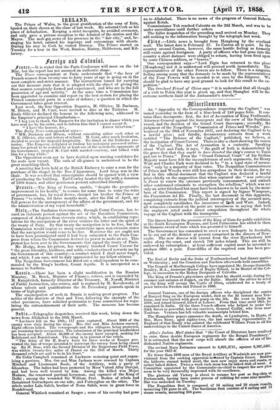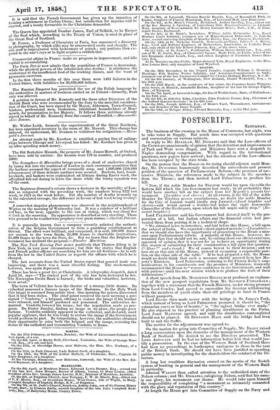311inullautuun.
An " Appendix to the Correspondence respecting the Cagliari " was issued yesterday in the form of a blue-book of 240 pages folio. It con- tains three documents : first, the Act of Accusation of King Ferdinand's Attorney-General against the insurgents and the crew of the Sardinian vessel, and the decision of the Grand Court thereupon ; secondly, the judgment of the Neapolitan " Commission of Prizes and Wrecks," pro- nounced on the 28th of November 1857, and declaring the Cagliari to be a lawful Prize; and thirdly, documentary extracts from a work entitled " The Defence of the Cagliari," published, we believe, at the instigation of Count Cavour. There is also a chart showing the course of the Cagliari. The Act of Accusation is a curiosity. Speaking about Watt and Park, it says, " the guilt of both is demonstrated by the grave fact that they ought to hare directed the ship's course to Tunis and not to Ponza." Even the "Grand Criminal Court" of his Sicilian Majesty must have felt the incompleteness of such arguments, for Henry Watt and Charles Park were declared to be " in a legal state of accusa- tion" only by a majority of four votes. The Neapolitan Commissioners of Prizes and Wrecks were still less scrupulous in their decision,,for we find in this official document that the Cagliari was declared a lawful prize chiefly on the supposition that when captured she " was returning to Pon:a to renew the excesses previously consummated, and embark other condemned criminals to strengthen the rebellion," which was not only an utter falsehood but must have been known to be such by the mem- bers of the Commission. This report is signed by Signor Winapeare, the Procuratore del Re. Finally, the last document in this Appendix, comprising extracts from the judicial interrogatory of the accused men, most completely establishes the innocence of *irk and Watt. Indeed, all witnesses examined o the point are unanimous in saying that both the engineers acted under direct compulsion throughout the whole voyage of the Cagliari with the insurgents.
The Queen has sent the presents of the King of Siam for public exhibition at the South Kensington Museum, and Lord Palmerston has added to them the Siamese sword of state which was presented to himself.
The Government has consented to erect a new Bishopric in Australia, to be cut out of the district at present comprised in the diocese of New- castle. The new diocese will extend from the river Hawkesbury 800 miles along the coast, and stretch 700 miles inland. This see will be endowed by subscription ; at least sufficient capital must be invested to produce 6001. a year. Four-fifths of the required sum has been pro- vided.
The Earl of Derby and the Duke of Northumberland had dinner-parties on Wednesday ; and the Countess and Duchess afterwards held assemblies. The Council of Marlborough College have appointed Mr. George Granville Bradley, M.A., Assistant-Master of Rugby School, to be Master of the Col- lege, in succession to the Bishop Designate of Calcutta.
The King of Prussia's physicians advise that he should reside during the summer and autumn at Zoppet, on the Baltic. Should the advice be acted on, the King will occupy the Castle of Oliva, celebrated for a treaty of peace between Sweden and Poland in 1660.
General Ventura' one of the foreign officers who disciplined the armies of Runjeet Sing on the European model, died on the 3d instant near Tou- louse, and was buried with great pomp on the 5th. He went to India in 1819, and joined General Allard at Lahore. From that time until 1851, he remained in India. Of the three French officers who helped to make the Sikh forces so powerful, but one survives, General Caillie, who lives near Toulouse. Ventura has left valuable manuscripts behind him.
The Hampshire papers announce the death, at Lymington, in Hants, of Mrs. Mara Story, aged eighty-two, the last surviving representative m England of that family who assisted the celebrated William Penn in all his undertakings in the United States of America.
Allen's Indian Mail states that "the Court of Directors have resolved to raise three double European regiments for the Bengal Presidency." It is estimated that the new corps will absorb the officers of six of the disbanded Native regiments.
The revised Navy Estimates amount to 8,821,3711., against 8,207,5261. for the year 1857-8.
No fewer than 1050 men of the Royal Artillery at Woolwich are now pro- visioned from the cooking apparatus ins‘nted by Captain Grant. Besides the hitherto eternal boiled meat, the men now enjoy stews and roasts, or rather baked dishes. Twice a week each mess has its baked dish of meat. A Committee appointed by the Commander-in-chief to inspect the new plan seem to be very favourably impressed with its excellence.
The glorious old Victory is about to resume her post as flag-ship at Portsmouth, having been under process of refitting for some nine months. She was undocked on Tuesday.
The Neapolitan fleet is composed of 16 sailing and 29 steam vessels, mounting 746 guns in all. The Sardinian fleet consists of 6 sailing and 12 steam vessels, mounting 316 guns. It is said that the French Government has given up the intention of forming a settlement in Cochin China; but satisfaction for injuries will be exacted, and a treaty favourable to the Christians demanded.
The Queen has appointed Dunbar James, Earl of Selkirk, to be Keeper of the Seal which, according to the Treaty of Union, is used in place of the Great Seal of Scotland.
M. Persoz, a Professor of Chemistry at Paris, has announced a discovery in photography, by which silks may be ornamented easily and cheaply. The silk stuff is impregnated with bichromate of potash' any portions then ex- posed to the sun's rays or to light acquire a reddish tint.
Commercial affairs in France make no progress in improvement, and idle capital is accumulating.
The Paris Patrie now admits that the population of France is decreasing, while the physical powers of the inhabitants also decline : it attributes the misfortune to the insufficient food of the working classes, and the want of gymnastic exercises.
In the first three months of this year there were 1495 failures in the United States, with liabilities for 30,639,000 dollars.
The Russian Emperor has permitted -the use of the Polish language by the authorities in matters of business carried on in Poland—formerly, Russ only was allowed.
A petition in favour of Mr. Kennedy and the three other Directors of the British Bank who were recommended by the Jury to the merciful considera- tion of the Court, has been signed by the Mayor, Aldermen, Town-Council, bankers, professional men, tradesmen, inhabitant householders of Mon- mouth, for presentation to her Majesty. It follows three petitions already signed in behalf of Mr. Kennedy from the county of Hereford.-11founioufk- shire Beacon.
Mr. Walter Leith, formerly the superintendent of the Great Northern, has been appointed secretary in the room of Mr. Mowatt. This chance has induced, we understand, Mr. Denison to withdraw his resignation.—Hera- path' s Journal.
An attempt made by Mr. Kershaw to establish a paying line of sailing- ships between Chicago and Liverpool has failed : Mr. lershaw has given it up after spending much money.
The Old Berkshire Hounds, the property of Mr. James Morrell, of Oxford, have been sold by auction : the hounds were 176 in number, and produced 26001.
The Semaphore de Marseilles brings news of a shoal of anchovies chased by tunny fish into the roadstead of Toulon in such enormous quantities that the harbour assumed the aspect of vermicelli soup, and 1,000,000 (300,000 kilogrammes) of these delicate sardines were secured. Buckets, hats, hand- kerchiefs and baskets were replenished ad libitum during Easter week, the affrighted fish not daring to leave the shore while the tunny squadron was off the coast.
The Registrar-General's return shows a decrease in the mortalit; of Lon- don as compared with the preceding week, the numbers being 1221 last week, to 1374 in the week before. But the number of deaths is nearly up to the calculated average, the difference in favour of last week being twenty- one.
A somewhat singular phenomenon was observed in the neighbourhood of Wigton on the morning of Wednesday last. It was a rainbow of a brilliant red hue, in the west, opposite to the sun at rising, which was about five o'clock in the morning. Its appearance is described as very startling. Those who pretend to be weatherwisc prophesy very great storms.— Carlisle Patriot.
It is generally known that a company recently solicited the authori- zation of the Belgian Government to form a gambling establishment at Ostend. The offers were brilliant, and comprised, it is said, 100,000 francs per annum to the town funds, 25,000 francs to charitable institutions, 25,000 francs to the town for fetes, &c. But we learn that the Belgian Go- vernment has declined the proposal.—Flandre Maritime.
The New York Evening. Post states positively that Thomas Allsop is in New York, in very poor circumstances ; but that the stories that English and French police-officers are searching for him are all fictitious—he is safe from the law in the United States as regards the offence with which he is charged.
The last accounts from the United States report that general trade was improving, and there was a more cheerful feeling. The stock-market. however, was again depressed.
There has been a great fire at Christiania. A telegraphic despatch, dated April 14, says—" The central part of the city has been destroyed by fire. The Norwegian Credit Bank is burned ; the books and valuables, however, were saved."
The town of Velletri has been the theatre of a strange little drama. Its cathedral possessed a famous image of the Madonna. In the Holy Week this image is screened from public view. One morning the priests discovered that it had been stolen. The chief priest received the next morning a note signed " Vendetta," a brigand, offering to restore the image if his brother were released, and himself pardoned and pensioned. The authorities de- murred. Vendetta lowered his terns; but the negotiation made no pro- gress. On Easter Sunday, finding no image in its place, the people grew furious. Vendetta suddenly appeared in the cathedral, and declared, amid popular applause, that he was ready. to restore the image if the Government would perform its part. By temporizing, however, the authorities obtained their opportunity, to seize both the brigand and the image, restoring the statue to the cathedral and transmitting Vendetta to Rome.



























 Previous page
Previous page